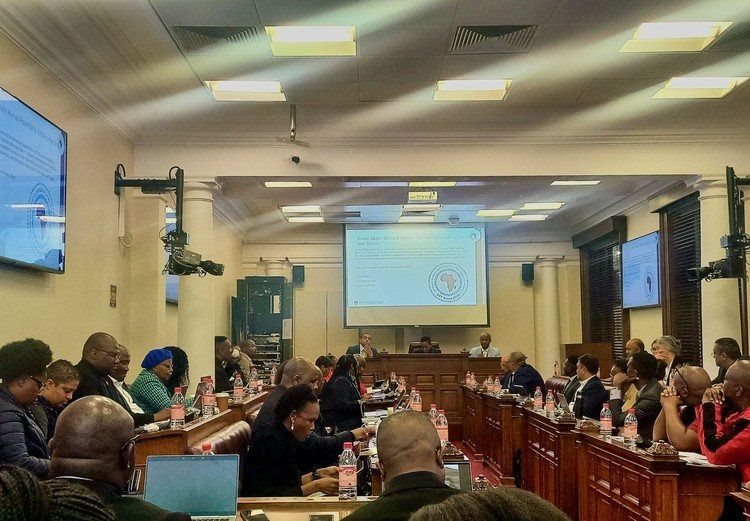
Maladministration, assassination attempts, academic malpractice, and concerns about the operations of the National Student Financial Aid Scheme (NSFAS) were some of the main issues raised by universities at a parliamentary briefing on Wednesday.
The University of Cape Town (UCT), the University of Fort Hare (UFH), and the University of South Africa (Unisa) briefed the portfolio committee on higher education about governance, administration and related matters following several investigations into the institutions.''
UFH vice-chancellor Professor Sakhela Buhlungu told Parliament that the safety of students and staff was one of the main issues raised in council meetings.
Earlier this year, Buhlungu was allegedly a target of an assassination attempt. His bodyguard, Mboneli Vesele, was shot dead outside Buhlungu’s residence in Dikeni.
Buhlungu said the first assassination attempt on a staff member was made in 2012 and the second in 2022. He said the university established a protection programme based on risk assessments, and at least 80 staff members have been identified for priority.
“We are working with Raymond Mhlaba Municipality and getting a policing forum on campus,” he told MPs.
Last year, President Cyril Ramaphosa signed a proclamation authorising the SIU to investigate maladministration in the university’s faculty of public administration in relation to the awarding of honours degrees, the management of funds, and sourcing of public servants for study in various faculty programmes.
Buhlungu said the SIU is expected to complete its interim report by the end of October and finish its investigation by April next year.
He said the institution has its own investigation. “What I can say with certainty is that we as Senate have deregistered 17 students over the last while. They were deregistered because they were irregularly registered, meaning they did not meet the requirements for what they were admitted.”
In May, an independent assessor advised Higher Education Minister Blade Nzimande that the management and council of Unisa be “relieved of their duties” and the institution placed under administration
An independent assessor, Professor Themba Mosia, was appointed by Nzimande in September last year. In his 316-page report, Mosia said his assessment revealed a “cauldron of instability characterised by a culture of fear, intimidation, bullying, maladministration, financial irregularities, poor student services, academic malpractices, leakage of confidential records, and questionable management and council decisions”.
Mashukudu James Maboa, chair of Unisa's council, said the report “should be taken for legal review because we don’t agree with everything in there”.
“We never got a chance after the assessor did his work to respond after the report was finalised. We were not given a right of reply… There are clear misunderstandings and contextual interpretations and inaccuracies in the report,” he said.
Earlier this month, Nzimande announced the department would be placing UNISA under review. He said the decision followed the independent assessor’s report.
Maboa said UFH’s council responded to Nzimande, “requesting to allow the court to make its ruling on the IA (Mosia’s) report before he made his final decision”.
“Unisa is a top ten institution. If you look at the top ten universities, how many of them have been put under administration? Placing UNISA under administration causes irreparable harm to the reputation and stature of UNISA and will negatively affect its rankings,” said Maboa.
Dr Daya Reddy, UCT’s interim vice-chancellor, said that changes to the NSFAS funding model have raised concerns.
“Accommodation costs capped at R45K by NSFAS, and funding alterations have implications for our financial aid commitments, particularly regarding residence fees. The impact of this in the 2023 budget is R177m additional allocation by the university to financial aid,” said Reddy.
UCT’s Council told Parliament that it has given the Independent Panel until the end of September to complete its probe into a governance crisis at the institution.
The panel, established by the council in October 2022, released an interim report on 17 May 2023, recommending the removal of the former Chair of Council.
At the heart of the probe was whether then vice-chancellor Professor Mamokgethi Phakeng and former chair of council Babalwa Ngonyama misled the university’s executive and Senate about the reasons for the departure of the deputy vice-chancellor for teaching and learning, Associate Professor Lis Lange.
They claimed Lange had resigned for personal reasons. Lange claimed she had been pushed out.
In February, the council approved a settlement agreement terminating Phakeng’s appointment and she had since severed her relationship with the university, the panel noted. Ngonyama resigned with immediate effect after recommendations made by the independent panel’s report.
Council chairperson Norman Arendse told the committee the panel had asked for an extension to complete the full report by mid-October. “We said we would like the report no later than 30 September,” he said.
Arendse said the delay in getting the report has also affected sign-off on the university’s annual financial statement and annual report.
He said there is an attempt to interdict and prevent the distribution of the panel’s final report. “I have called for a special council meeting [Thursday] night to discuss this demand and find a resolution. It is most likely that we won’t accept [the demand] and it’s important for everyone concerned that the report be publicised as soon as possible.”
Published originally on GroundUp.

GroundUp is a community news organisation that focuses on social justice stories in vulnerable communities. We want our stories to make a difference.
Go to: http://www.groundup.org.za/